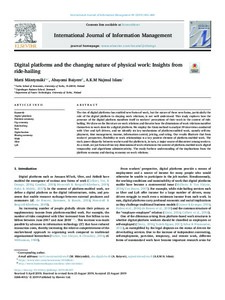Digital platforms and the changing nature of physical work: Insights from ride-hailing
Matti Mäntymäki; Abayomi Baiyere; A.K.M. Najmul Islam
https://urn.fi/URN:NBN:fi-fe2021042823942
Tiivistelmä
The rise of digital platforms has enabled new forms of work, but the nature of these new forms, particularly the role of the digital platform in shaping work relations, is not well understood. This study explores how the presence of the digital platform manifests itself in workers’ perceptions of their work in the context of ride-hailing. We draw on the literature on work relations and theorize how the dimensions of work relations manifest themselves in work done for a digital platform. We employ the Gioia method to analyze 39 interviews conducted with Uber and Lyft drivers, and we identify six key mechanisms of platform-enabled work, namely self-employment, time management, income, information control, pricing, and rating. Our results illustrate that from workers’ perspective, flexibility in work relationships is a key positive element of platform-enabled work. The stark power disparity between workers and the platform is, in turn, a major source of discontent among workers. As a result, we put forward two key dimensions of work relations in the context of platform-enabled work: digital temporality and algorithmic administrativity. The study furthers understanding of the implications from the platform economy and sharing economy on work relations.
Kokoelmat
- Rinnakkaistallenteet [29335]
